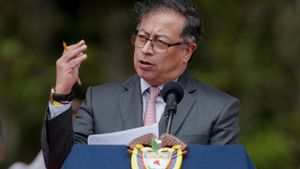Ukrainian forces have successfully targeted and destroyed the command post of Russia's Kursk group of forces, marking another pivotal moment in the extended conflict between the two nations. This significant strike took place on January 31, 2025, in the city of Rylsk, located within Russia's Kursk Oblast. According to the General Staff of Ukraine's Armed Forces, the operation involved coordinated missile and artillery forces, which executed their strike with precision. "...command and control post was destroyed," the staff declared, indicating the strategic importance of the target.
Reports from local Russian Telegram channels confirmed the occurrence of explosions within the Rylsk district, underscoring the immediate effects of Ukraine’s military actions. Notably, the Kyiv Independent, which followed up on these reports, stated it could not independently verify the information released by these channels. This discrepancy highlights the fog of war, where both sides may present differing narratives about the day's events.
This strike is part of Ukraine’s broader military strategy aimed at crippling Russian operational capabilities. By targeting key command centers, Ukraine seeks to disrupt Russia’s ability to conduct offensive operations effectively. The Ukrainian Armed Forces have emphasized the importance of such strikes, stating their objective is to diminish Russia’s offensive potential on the battlefield.
This operation follows Ukraine's limited incursion earlier, which occurred on August 6, 2024, when Ukrainian forces managed to capture approximately 1,300 square kilometers (about 500 square miles) of Russian territory. Although reports indicate Ukraine has since lost about half of the previously held territory, skirmishes continue, and the area remains contested. Ukrainian military strategies are now aimed at leveraging this presence to gain advantages in potential peace negotiations.
Adding complexity to the regional dynamics, North Korean troops have reportedly been deployed to support Russian forces stationed within Kursk Oblast. Their involvement indicates the multilayered nature of the conflict, where international partnerships affect the balance of power on the ground. The alliance between North Korea and Russia serves to bolster Russian capabilities, potentially countering Ukraine's recent gains.
This all-encompassing strike reflects the intense and fluctuative nature of modern warfare, where each side seeks to outmaneuver the other not only through direct combat but by investing efforts to target the other’s command structures. The situation remains fluid, and each development prompts heightened scrutiny from military analysts and the international community alike.
With the precarious balance of power shifting time and again, Ukraine’s commitment to strategic strikes poses significant questions about the operational capabilities of Russian forces and the ensuing reality on the battlefield. Whether such tactics will lead to meaningful outcomes at the negotiating table remains to be seen.
Looking forward, as fighting continues within the region, the respective efforts by both the Ukrainian forces and their Russian counterparts will be pivotal. The potential for future engagements and shifts will depend not only on ground realities but also on how international alliances play out, particularly the influence of North Korean support for Russian military operations.
The prospect of peace talks hangs heavily over this tumultuous scenario, with each strike amplifying the voices for and against new negotiations as the conflict endures. For now, both nations remain locked in their military postures as they navigate through this complex web of warfare.



